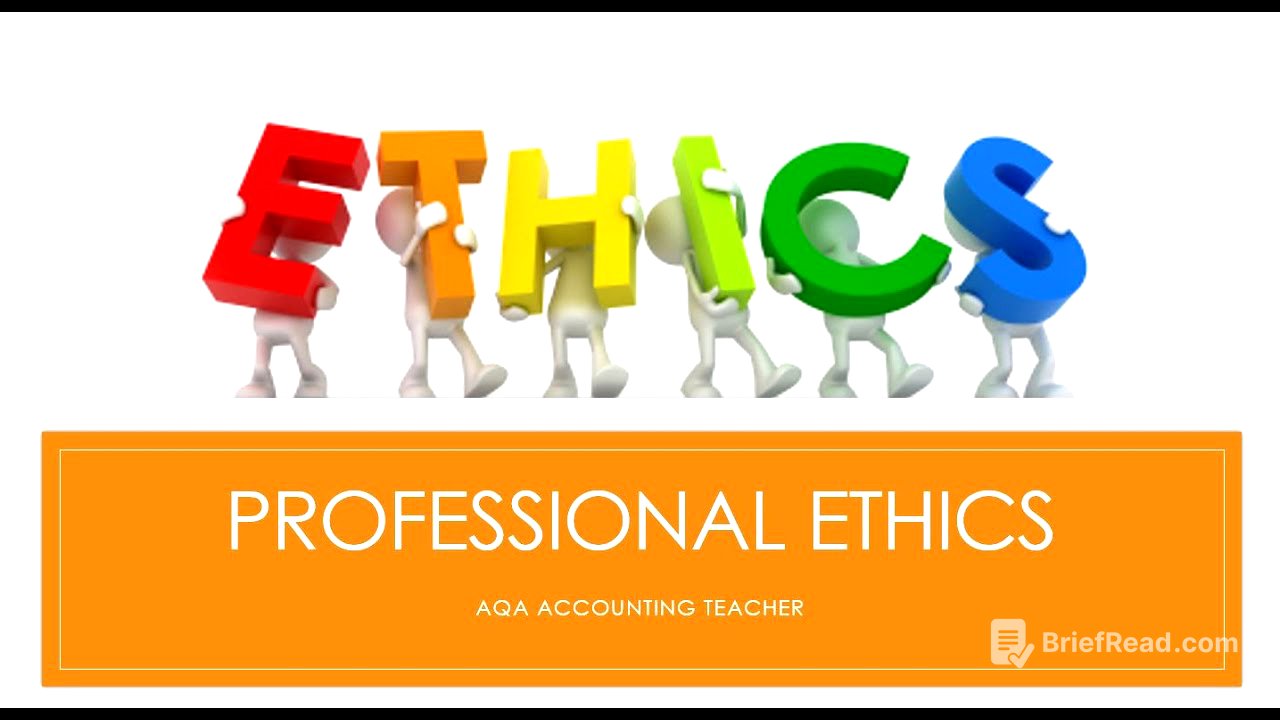TLDR;
This video provides a comprehensive overview of professional ethics for accounting students, focusing on the knowledge needed to tackle related exam questions. It covers the five fundamental principles of professional ethics (integrity, objectivity, professional competence and due care, confidentiality, and professional behaviour), the five threats to these principles (self-interest, self-review, familiarity, intimidation, and advocacy), and a five-step approach to solving ethical dilemmas. The video also touches on relevant accounting concepts, regulations, and the responsibilities of directors and auditors.
- The five fundamental principles of professional ethics are integrity, objectivity, professional competence and due care, confidentiality, and professional behaviour.
- The five threats to these principles are self-interest, self-review, familiarity, intimidation, and advocacy.
- A five-step approach can be used to solve ethical dilemmas: establish the facts, identify compromised ethical principles, identify threats, consider internal procedures, and consider alternative actions.
Introduction to Professional Ethics [0:00]
The video introduces the topic of professional ethics, focusing on the knowledge required to answer related questions in exams. It will cover the five fundamental principles of professional ethics, the threats to these principles, and the steps to solve ethical dilemmas. The content is primarily aimed at addressing the 25-mark Section C questions from Paper One.
Accounting Concepts and Regulations [0:26]
A review of accounting concepts is essential, particularly the gateway concepts and consistency, prudence, and accruals, which are most relevant to professional ethics. Knowledge of accounting regulations, including the Companies Act 2006, FRS 102, International Accounting Standards, and IFRS, is also important. While detailed knowledge isn't required, awareness of IAS 1 and IAS 7 is beneficial.
Role of Professional Accounting Bodies [1:25]
Understanding the role of professional accounting bodies, such as the CCAB and CIMA, is crucial. These organisations have their own ethical codes of conduct based on the five fundamental principles, providing guidance on identifying threats to these principles.
Responsibilities of Directors and Auditors [2:06]
Directors are responsible for preparing financial statements, while auditors express an opinion on them. Both are appointed by shareholders. Internal auditors also play a role in ensuring proper accounting and preventing fraud within a company.
Five Fundamental Principles of Professional Ethics [2:38]
The five fundamental principles apply to accountants, directors, and auditors. These are integrity (being straightforward and honest), objectivity (avoiding bias and undue influence), professional competence and due care (maintaining knowledge and skills), confidentiality (not disclosing information without authorisation), and professional behaviour (complying with laws and avoiding disrepute). It's important to learn these principles, understand their meaning, and identify potential threats to them. Mnemonics like "In Oxford Penguins Can Party" or "People In Cars Often Park" can be helpful for memorisation.
Integrity [3:45]
Integrity involves being straightforward and honest in all professional and business relationships. This means not lying or withholding information that could lead to wrong decisions. One must not be associated with reports, returns, or communications containing false or misleading statements, or anything that omits or obscures information. The required action is to disassociate from such information.
Objectivity [4:31]
Objectivity means not allowing bias, conflicts of interest, or undue influence to override professional or business judgments. Accountants, auditors, and directors must maintain objectivity and avoid situations that compromise it. For example, auditing a company's accounts when married to the managing director is inappropriate.
Professional Competence and Due Care [5:17]
Maintaining professional competence and due care requires keeping up with current developments in practice, legislation, and techniques through continuing professional development (CPD). It also involves ensuring professional staff receive training and supervision, and having sufficient time to carry out work carefully and thoroughly. One should not undertake work for which they are not properly trained or rush to meet unrealistic deadlines.
Confidentiality [6:26]
Confidentiality involves not disclosing information to third parties without proper authorisation, unless there is a legal or professional duty to do so. Information should not be used for personal advantage or passed to third parties for purposes like insider share dealings. Disclosure is only permissible when required by law, such as in cases involving HMRC investigations, money laundering, or anti-terrorism efforts.
Professional Behaviour [7:02]
Professional behaviour requires compliance with relevant laws and regulations and avoiding actions that bring the profession into disrepute. This includes not making exaggerated claims about services or qualifications and avoiding disparaging or unsubstantiated comparisons to others' work.
Check Your Learning: Fundamental Principles [7:31]
A quick review to ensure understanding of the five fundamental principles: integrity, objectivity, professional competence and due care, confidentiality, and professional behaviour.
Five Potential Threats to Fundamental Principles [8:19]
The video transitions to discussing the five potential threats to the fundamental principles, which can compromise ethical behaviour. These threats are self-interest, self-review, familiarity, intimidation, and advocacy.
Detailed Look at Potential Threats [9:18]
A more detailed explanation of each threat:
- Self-interest: Where a financial or other interest inappropriately influences behaviour.
- Self-review: Where an accountant re-evaluates their own previous judgments or data.
- Familiarity: Where close personal relationships make an accountant too sympathetic to others' interests.
- Intimidation: Where an accountant is deterred from acting objectively due to real or perceived threats.
- Advocacy: Where an accountant promotes a client's position to the point that objectivity is compromised.
Ethical Dilemmas and Five-Step Solution [11:02]
The video introduces a five-step approach to solving ethical dilemmas:
- Establish the facts.
- Identify which ethical principles are potentially compromised.
- Identify the threats to those ethical principles.
- Determine if any internal procedures or safeguards are in place.
- Consider alternative courses of action.
Ethical Dilemma 1: Expense Allocation [12:19]
The first dilemma involves a manager asking an accountant to claim expenses under a different cost centre to avoid an overspend in the correct budget. This raises questions about the reliability of budget information and whether senior management could be misled. The ethical issues involve integrity and objectivity, with a potential intimidation threat from the manager. Internal procedures and safeguards should be considered, and alternative courses of action explored, such as discussing the situation with the manager or an independent person. The "mirror test" is introduced as a way to assess whether one is comfortable with the chosen course of action.
Ethical Dilemma 2: Non-Disclosure to Auditors [18:21]
The second dilemma involves an accounting systems manager overhearing that the financial controller has not disclosed certain information to the external auditors, including a redundant piece of machinery and a bribe paid to secure a sales contract. The culture within the finance department is antagonistic towards the auditors. The facts need to be corroborated, and the ethical issues involve integrity, confidentiality, and professional behaviour. Internal procedures for whistleblowing should be considered, and alternative courses of action explored, such as discussing the matter with the finance director or the board of directors. Legal advice may be necessary due to the potential criminal activity.
Check Your Learning: Threats to Fundamental Principles [23:56]
A final review to ensure understanding of the five threats to the fundamental principles: self-interest, self-review, familiarity, intimidation, and advocacy.
Conclusion [24:18]
The video concludes by summarising the key points and encouraging viewers to like and subscribe for more content. A separate video will cover a past exam question on professional ethics.









